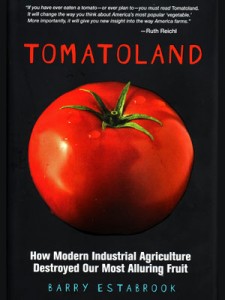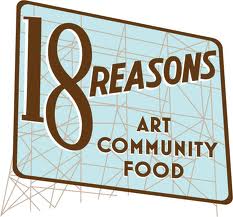18 Reasons hosts Tomatoland author Barry Estabrook
Posted in Uncategorized.

18 Reasons hosts Tomatoland author Barry Estabrook
U.S. Supreme Court Justice Louis Brandeis said “Sunlight is the best disinfectant” in regards to openness and transparency in government. Extended amounts of sunlight is also one of the best ways to grow a delicious tomato. Barry Estabrook, author of “Tomatoland,” drove these points home in a dinner/talk hosted by 18 Reasons, the community outreach organization of San Francisco’s own Bi-Rite Market and Bi-Rite Creamery. Estabrook writes the popular food blog Politics of the Plate and his article for Gourmet on labor abuses in Florida’s Tomato fields received the 2010 James Beard Award for magazine feature writing. This article has now been expanded into a book that details how the industrial farming behemoths grow the majority of supermarket/fast food tomatoes and the blind eye they turn to horrific abuses of the imigrant labor force in Florida. The talk was both informative and shocking.
Estabrook’s research took him to Immokalee, Florida, the tomato capital of the United States. During the winter months of December to May as much as 90 percent of the fresh domestic tomatoes we eat come from south Florida, and Immokalee is home to one of the area’s largest communities of farmworkers. According to Douglas Molloy, the chief assistant U.S. attorney based in Fort Myers, Immokalee has another claim to fame: It is “ground zero for modern slavery.” When Molloy was asked if it was safe to assume that a consumer who has eaten a fresh tomato from a grocery store, fast food restaurant, or food-service company in the winter has eaten a fruit picked by the hand of a slave, he corrected the choice of words. ‘It’s not an assumption. It is a fact.’ In the last 15 years, Florida law enforcement officials have freed more than 1,000 men and women who had been held and forced to work against their will in the fields of Florida, and that represents only the tip of the iceberg.
Not only are the working conditions of the farm-workers horrible, but as anyone who has ever tasted a winter tomato from a chain supermarket knows, the taste is virtually non-existent. Estabrook explained that Florida soil where the tomato plantations exist is some of the worst soil for tomatoes. Sandy and drenched in harmful pesticides, these plantations produce barely edible tomatoes. In order to last the long truck ride to stores, these unripened tomatoes are picked while still green and hard. Ethylene gas is used to “ripen” the fruit for store shelves. However, the gas only turns the tomatoes red, it doesnt really ripen the fruit. Essentially, you are still eating the same unripened, hard green tomato. This is why winter tomatoes are so flavorless. In addition, these tomatoes have a third of the vitamin C of Summer tomatoes and less calcium but 14 times the sodium! Also, pestcide residue from 110 different pesticides and fungicides has been found on 54% of tomatoes in grocery store produce sections. 34 of these agents make Pesticde Actions “Bad Actor” list because they contain known carcinogens, mutagens, neurotoxins and deadly poisons.
So, what can you do in your community to effect change?
- In the winter, dont buy tomatoes shipped from across the country. If they can’t be grown locally in your current climate, dont eat them.
- Instead of a boycott, Estabrook suggests a “Buycott.” If you see locally grown, organic tomatoes, buy those and send a message to your grocer that those are the only ones you will buy. By buying a local, organic tomato you are supporting just wages and healthful choices.
- Grow your own. If you have a sunny yard or balcony, tomatoes can be grown easily and cheaply. And nothing beats the flavor of a sun-ripened tomato.
- Consider donating to the Coalition of Immokalee Workers. This organization has been fighting for humane treatment for farm workers since 1993. They have managed huge success getting tomato buyers such as McDonalds, Burger King and Taco Bell to agree to pay an additonal $0.01 per pound for their tomatoes so that farm workers can have a living wage. And the fight continues. Currently, no giant food supermarket chain, other than Whole Foods, has agreed to this penny a pound more agreement.

The event, hosted by 18 Reasons, included an amazing organic heirloom dinner prepared by our hosts. 18 Reasons
was created to bring people together and deepen our relationship to food and community. Through an innovative community center and thought provoking, fun programming, they have inspired action and fostered collaboration toward creating a just and sustainable food system. Dharma is grateful to be a member of this amazing group of concious foodies. You can check out their upcoming calendar of events here.
Barry Estabrook has succeeded in shining much needed sunlight on the treatment of tomatoland farm workers and on the tomatoes they grow. What change can you enact in your own life that will improve the lives of the Immokalee farm workers in Florida and send a message to the huge industrial farming companies that these tomaotes are no longer acceptable on your plate?